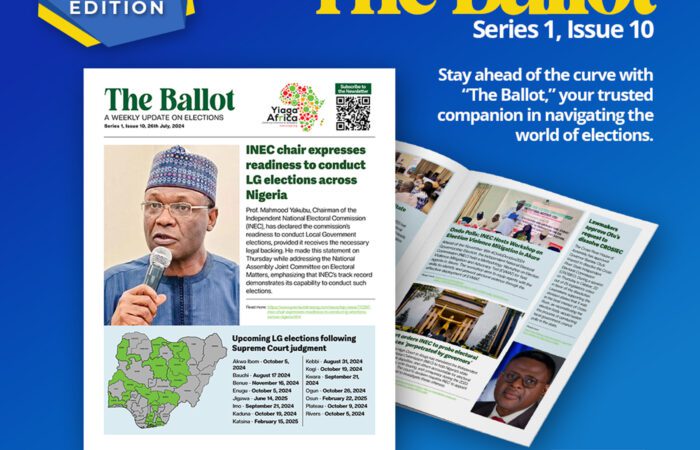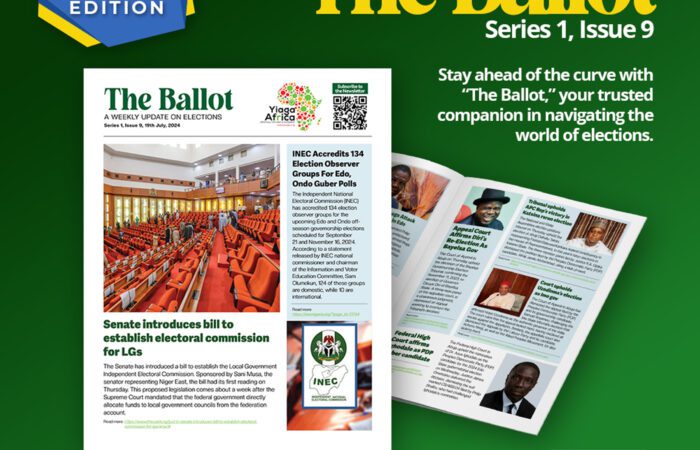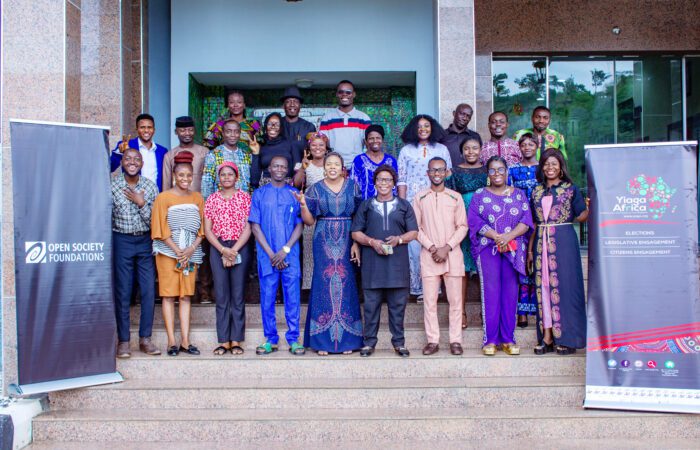11 days to the Ekiti Governorship Election: Voter Inducement Persists while questions remain around the allocation of Voters to new Polling Units lingers
Introduction
In exactly 11 days’ time, the residents of Ekiti State will go out to vote in what is likely to be another highly competitive election. The election will be the first election to be conducted under the Electoral Act 2022 and the second state-wide election to be conducted using the Bimodal Voter Accreditation System (BVAS). Thus, the Ekiti election will serve as a testing ground for assessing INECs preparedness for the 2023 general election. It also presents an opportunity to assess the implementation of the new Electoral Act and the efficacy of the policies, processes and innovations introduced by INEC especially its ability to adapt learnings from recent elections. This election will also be a litmus test to assess the role of security agencies in the election, and the commitment of political parties’ to electoral integrity, stakeholder engagement and citizen participation, especially with the dynamics of the current politics of the 2023 General elections.
For the Ekiti state governorship election, Yiaga Africa deployed long term observers to observe the pre-election environment. The finding in the pre-election phase indicates that the Independent National Electoral Commission (INEC) remains consistent in implementing its preparatory activities in line with its Election timetable. This includes the training of personnel for the election, the deployment of materials and the collection of the ongoing Permanent Voters Card (PVC). In addition, the commission conducted a mock accreditation in selected local government areas and polling units in the state using Bimodal Voter Accreditation System (BVAS). According to INEC, the purpose of the mock accreditation was to test the functionality of the BVAS technology and build confidence in the voters. The commission also increased the number of polling units in the states, to improve accessibility of voters to polling units. However, conerns have emerged with the allocation of voters to the new polling units created by INEC.
The Ekiti governorship election has so far witnessed an increase in money politics as the big spenders dole out cash in a supposed “door to door” campaigns, practice now becoming commonplace in Nigeria’s election. With the elections happening alongside the primaries for the 2023 general election, the politics in the Governorship elections are riding on negotiations and renegotiations for political positions within party structures and at an inter-party level. As observed in this pre-election phase, the election is projected as a three-horse race with the Social Democratic Party (SDP) rising in its prominence in the state in competition with the All Progressives Congress (APC) and Peoples Democratic Party (PDP) for the Governorship seat in this campaign phase. The observation indicates that amongst the parties contesting, the APC, PDP and SDP have campaigns ongoing in each of the 16 local government areas (LGAs). Interactions with stakeholders and engagement within the state indicate that the June 18 governorship election will be one determined by money- visible in the level and frequency of voter inducement/vote-buying and personality contest.
Yiaga Africa has been observing the Ekiti Pre-Election Environment since March 2022. Yiaga Africa’s WTV specifically trained and deployed 25 Long-term observers (LTO) to the 16 LGAs to observe the pre-election environment until June 15, 2021. Yiaga Africa has so far issued 3 reports of its pre-election observation and will issue 2 more reports before the election. Based on its observations, Yiaga Africa has identfied some emerging concerns requiring attention ahead of the June 18 2022 governorship election.
Emerging Concerns
- Rising Spate of Voter Inducements: Yiaga Africa is immensely concerned that the spate of voter inducement which has taken a dimension of the door to door engagement may become the major determinant in the elections. We are worried that, despite persistent campaigns against voter inducement, politicians have continued to prioritize vote trading over issue-based campaigns. Just like in the 2018 Ekiti governorship election, where mandates were presumed to be purchased rather than duly elected, this year’s election is shaping up to be a bigger money fiesta. The Ekiti election may be an election decided by the highest bidder.
- Poor Publicity of the Mock Election Exercise: The mock accreditation exercise conducted by INEC in Ekiti to test the functionality of the BVAS and the capacity of its staff on Monday, 30th May, is a laudable initiative. However, we are concerned about the supposed success and viability of the mock exercise due to poor citizens’ participation in the process. The mock accreditation was conducted amidst poor publicity and a lack of information on the exercise by the INEC. The low participation and the few numbers of 12 sampled locations may not have sufficiently provided an adequate assessment of the deployment of the BVAS.
- Allocation of Voters to New Polling Units: With the expansion of access to polling units conducted in 2021, Ekiti state has 250 new polling units to increase the number of polling units in the state from 2,195 to 2,445. While the effort is intended to ease election administration for the commission and access to prospective voters, Yiaga Africa is, however, concerned about the commission’s strategy for allocating polling units to voters in the state. With barely two weeks to the election, concerns around imbalance in the distribution of voters to polling units remain an issue. Some polling units in Ekiti have as many as 3000 registered voters. The likely shortfall in the number of polling officials, and the high number of registered voters in these polling units may pose a major challenge for crowd control and effective management of the polling units on election day. We expect the commission to improve its communication on the new polling units to inspire voter confidence in the process.
- Technology Adoption and the BVAS Deployment: A major concern ahead of the election is the functionality of the BVAS in accrediting voters timely and efficiently and the quality of training of personnel using the technology. With the poor citizens’ participation during the mock accreditation exercise, it is important that INEC invests in more voter information and publicity on the BVAS as well as promote its value to the election. This will inspire citizens’ confidence in the process. Additionally, there is the need to invest in adequate training of personnel and ensure that only trained personnels are deployed on election day.
- INECs Decision on Invalid Registrations and Possible Impact on the Process: With the recent news that over forty-seven thousand (47,000) invalid registrations were discovered in Ekiti state, we are worried that affected registrants may not be aware of the fate of their registration and thus have no opportunity to review the situation before an election.
- Permanent Voters Card Collection Rate: We commend INEC on early commencement of the PVC collection exercise for both old and new registrants. This is an improvement from the 2021 Anambra Governorship election. However, we are concerned that the PVCs of some newly registered voters are not yet ready and available for collection, despite voter efforts to collect their PVCs.
Summary of Observation Findings:
Election-Related Preparatory Activities by INEC:
Yiaga Africa WTV LTOs have continued to observe election preparatory activities undertaken by INEC across the 16 Local Government Areas (LGA) of Ekiti state. This includes the collection of PVC which is still ongoing at INEC LGA offices. Some other preparatory activities conducted by INEC include the public launch and release of the Electronic Voter Register to the representatives of the political parties on May 18, 2022. The data from the voter register has revealed that 988, 923 voters are expected to vote in the election, with more women registered to vote at 51%. Young voters between the ages of 18-34 constitute 38.56% of the voters in Ekiti state. With women making up over 50% of the registered voters, the women in Ekiti have the power to determine the outcome of the election.
INEC has also commenced its training of Ad hoc officials in the state for the election. Other training training of representatives of the rank and file of the Nigeria Police and other security agencies in the state on understanding the new electoral act, their role in the electoral process as well as their professional ethics.
Mock Accreditation of Voters in Ekiti State:
As observed by Yiaga Africa’s LTO, INEC conducted a mock accreditation of voters in Ekiti state to test the functionality of the Bimodal Voter Accreditation System (BVAS) that will be deployed for the governorship election in the state. The exercise was conducted on Monday, May 30th, 2022, in 12 PUs spanning six local government areas (LGAs) (Ado Ekiti, Ekiti South West, Ikere, Ifelodun/Irepodun, Ido-Osi, and One). While the process appeared to be seamless, citizen participation was low. This is reportedly owing to the inadequate publicity by the Commission. For instance, as at 2 p.m only 5 people had approached INEC officials for the mock accreditation at Ado ‘J’ Okesa Opposite High Court /GRA, Police I, while in Ado ‘J’ Okesa Set Mango Area / G. R. A., Police II only 20 participated in the exercise.
Voter Information/Education:
The WTV LTOs observed and reported notable voter education/information as conducted by INEC, NOA and some CSOs. The majority of the voter education observed was through the medium of workshops, voter sensitisation programs, posters, social media, jingles, and TV and radio programs. Workshops, voter sensitisation events, posters, social media, jingles, and TV and radio shows accounted for the majority of voter education observed. The majority of the voter education/information content focused on PVC collection, election day procedures, and messages encouraging a peaceful and violence-free election across the 16 LGAs of Ekiti State. However, there were few LGA’s were voter information campaigns were not observed. These are:
Specifically, voter information campaigns targeting women were not witnessed/heard of in Ekiti South-West, Ekiti West, Ijero, Ilejemeje, Irepedun/Ifelodun, Moba and Oye LGAs of the state.
Voter information campaigns targeting the youth were not witnessed/heard of in Ekiti South-West, Ekiti West, Ijero, Ilejemeje, Irepodun/Ifelodun and Oye LGAs of the state.
Voter information campaigns targeting PWDs were not witnessed/heard of in Ado-Ekiti, Ekiti South-West, Ekiti West, Ikere, Ilejemeje & Moba LGAs of the state.
Political Party Rallies/Campaigns
Yiaga Africa pre-election observation indicated that the “door-to-door” campaigns have become the trend and preferred style of the campaign for candidates/parties as they move from street to street, “door to door” engaging with prospective eligible voters. In addition, candidates/parties also made use of media adverts and jingles on the TV and Radio and few party campaign rallies.
There are higher levels of political campaigns by the APC, PDP and SDP across the 16 LGAs. The Accord Party has also remained visible in this campaign period although reports from the LTOs indicated that campaigns by the Accord Party were only not observed in Ado Ekiti, Irepodun/Ifelodun, Moba and Oye LGAs of the state.
Voter Inducement
WTV LTOs reported that palliatives in all forms of voter inducement like offering free fuel for okada riders, money as high as N20,000 in some cases given to people during town hall meetings, distribution of sewing machines, generators, motorcycles by the APC, PDP & SDP in Efon, Ekiti South West, Ekiti West, Gbonyin, Ido/Osi, Ijero Ikere and Ilejemeje LGA. What is perceived to be an offshoot of the “door to door” is the susceptibility of citizens to voter inducement, it was reported that on the spot transfers of up to N10, 000 were processed by those carrying out their “door to door” campaigns.
Critical Incidents
At the INEC office in Ise/Orun LGA WTV LTO witnessed some INEC officials fast-tracking the PVC collection process for those who are able to pay the sum of N500, while others are left unattended for hours or told to come back the day after to collect their PVCs.
WTV LTO reported physical violence in Ayetoro town, Ido-Osi LGA on the 19th of May leading to the deployment of police to the town to address the issue.
Recommendations
Independent National Electoral Commission (INEC)
- Yiaga Africa calls on INEC to ensure timely and adequate training of all ad-hoc staff in preparation for the election.
- As the election draws near INEC must ensure uniformity in its processes and consistency in the application of its guidelines across all polling units and LGAs in other to build confidence in the process.
- INEC should ensure proper coordination of all respective institutions, especially for all represented in the Inter-Agency Consultative Committee on Election Security.
- The commission should improve communication on its processes and procedures ahead of the elections. Yiaga Africa observed that participation in the Mock Election exercise was poor due to the poor publicity about the event.
Security
- As the elections draw near, security agencies working on the elections should ensure that all personnel deployed are properly trained.
- Security agencies should ensure the arrest and prosecution of all involved in any form of violence in the days leading to the election
- Security agencies, especially the police should publicize hotlines for citizens to make complaints, report incidents or access information on the election.
National Orientation Agency (NOA)
- Yiaga Africa calls on NOA to continue to intensify activities of voter education/information and extend their activities to the ward level.
Political Parties
- Yiaga Africa vehemently opposes any sort of voter bribery because it undermines the democratic process. Political parties are encouraged to run issues-based campaigns rather than tempting voters with unsustainable gifts that do not contribute to the state’s economic development.
Citizens
- Yiaga Africa calls on all registered voters in Ekiti State who have not collected their permanent voter cards (PVCs), to use these few weeks to collect their cards as the collection of PVCs is ongoing in all INEC LGA offices and to vote on election day.
- Yiaga Africa calls on citizens to shun all forms of voter inducement as it undermines the democratic process
Media
- Media practitioners working on the election should ensure compliance to the code of conduct regulating media reportage of the election and that they maintain a high standard of professionalism in their reporting
- Media organizations should ensure fair coverage of all the candidates/parties contesting in the election devoid of bias or prejudice
CSOs
- CSOs should continue to mobilize citizens to participate in the electoral process. Specifically, they should engage more in targeted campaigns to increase the participation of women, youth and PWDs.
Thank you and God bless Ekiti State
Ezenwa Nwagwu Cynthia Mbamalu
Board Member, Director or Programs,
Yiaga Africa Yiaga Africa
For media inquiries, please contact:
Moshood Isah
Media Officer, Yiaga Africa
Tel. +234 (0) 703 666 9339, Email: misah@yiaga.org
Learn more about #WatchingTheVote at www.watchingthevote.org or on social media on Facebook at facebook.com/yiaga.org or on Twitter @YIAGA.
The PREO Methodology
Yiaga Africa #WatchingTheVote deployed 25 Long-Term Observers (LTOs) to all the 16 Local Government Areas (LGAs) of Ekiti State to gather systematic information about the pre-election environment, including early warning electoral violence signs. To achieve this, Yiaga Africa LTOs are equipped with a checklist to observe and report on the electoral and political environment in the state. All Yiaga Africa WTV LTOs are recruited from their local government areas of residence to observe the electoral activities relating to voter education, political campaign activities, activities of marginalised groups (youth, women, and people living with disabilities) and election-related violence in the pre-election period. Their reports cover activities of the Independent National Electoral Commission (INEC), civil society organisations, political parties, the National Orientation Agency (NOA), and women and youth groups. The observers report on their observation findings on a bi-weekly basis via coded text messages to a Yiaga Africa WTV Database. Within reporting timeframes, observers also report on early warning signs and critical incidents demanding urgent attention as soon as they happen. The reports are compiled and shared with relevant election stakeholders for the needed response.
Yiaga Africa WTV PREO observation findings are not statistically representative of the entire state but indicate emerging trends during the pre-election period. Unlike the WTV Election Day observation methodology, Yiaga Africa does not rely on sample-based observation to carry out its PREO observation. This report covers the period between May 13 to May 26, 2022. Yiaga Africa, therefore, encourages users of this report to independently corroborate and respond appropriately to trends identified in this report.






